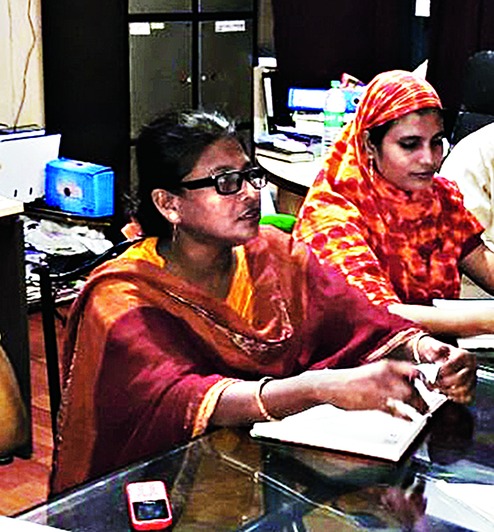


In February 2016, the Bharatiya Muslim Mahila Andolan (BMMA), an autonomous women's rights organisation in Mumbai, announced the establishment of Darul Uloom Niswaan - a school to train women to be qazis.
A qazi is a judge ruled by Islamic religious laws. After several rounds of training and tests in Jaipur, Mumbai and Bhopal, 15 out of 30 women earned their qaziyat certificates this April. Among them were two from Bengal.
Jamila Laskar is from Sarenga and Hakima Khatun from Domjur, both in Howrah. After much scheduling and re-scheduling, they agree to speak to The Telegraph in Khaskhamar, a village also in Howrah. Khaskhamar is where the Nari-O-Sishu Kalyan Kendra, or NOSKK, a welfare organisation for women and children, is headquartered. Both have been associated with NOSKK for long. As students they were volunteers, now they are full-fledged members involved with women's rights and health programmes.
Both women have been busy with work and home. Jamila has a year-old baby girl to look after and an eight-year-old. Hakima's daughter and son are 16 and nine. Training done, both women are now meeting maulavis, seeking their co-operation before they enter their new role.
At NOSKK, we are ushered into a medium-sized office room. Two European girls and some Indian women scurry out with containers of food - their lunch has been interrupted.
"Jamila and Hakima are at a meeting. They'll come down soon," announces Sheikh Saira Begum, the vice-president of NOSKK.
It is almost three in the afternoon when they walk in. Jamila, 29, is the taller of the two. Dressed in a salwar-kameez, her dupatta covers her head. Hakima, 40, has her dupatta flung on her shoulders. Amused that someone wants to interview them, neither knows where to begin.
It is better then to get to the point. As women qazis what do they think would be their special contribution? Both of them leap at the question. Muslim women in these parts are barely aware of their rights and are often cheated, they claim. Says Hakima, "For instance, at the time of marriage, the groom's side pays the bride a mehr. It is supposed to be a security amount equivalent to the groom's annual income. Technically, the wedding ritual can proceed only after it is paid in full. But not many are aware of this, and end up with just a token amount." Jamila adds, "We learnt about it during our training. Now, we can ensure that the women are well-apprised and their rights are protected."
Jamila couldn't clear her Class X boards and was married off early to a businessman. But Hakima is a graduate and married to a primary health practitioner. What prompted them to sign up at Darul Uloom Niswaan?
Says Hakima, "I wasn't aware that Muslim women have the right to become qazis. I heard about it at NOSKK and decided to give it a try." Quite the same with Jamila. Luckily for both, the families - the ones they were born into, as well as the ones they married into - were supportive. "My in-laws have always maintained that an educated girl like me should not sit at home," says Hakima. Jamila has only a sister-in-law. "She is very fond of me. The whole social scene for women here is much developed now."
It turns out that much of the awareness and development in these parts owes itself to a man who is no more.
Mohammad Moinuddin is referred to as Mastermoshai by all and sundry. He established the Tajmahal Gram Bikash Kendra in 1954.
Development begins with knowledge. Mastermoshai established a library with 11 books. He also set up madrasas in the region. Soon enough, he realised that for any sustained positive change, the women would have to be mobilised, empowered.
He practiced in life what he preached, and in due course sent his own daughters to college. "The community boycotted him when his first daughter began college," says Saira Begum. But it was his third daughter, Rahima, who was his shadow.
Today, the same Rahima Khatun is the convener of the Bengal chapter of the BMMA. At one point, Mastermoshai felt the need for an organisation for the women, by the women and so NOSKK was born in 1979. Rahima is also the secretary of NOSKK.
To get back to our women qazis - Jamila has enrolled in an open school to complete her school education. She intends to do her graduation as well. She and Hakima agree that their lives are exceptions and not the norm. The awareness at once overwhelms and also makes them feel their responsi-bility more keenly. As Jamila puts it, "We can't afford to trip or falter or make mistakes. A lot depends on us."
Ladies In Law
What qazis do
- Ensure presence of independent witnesses from both sides during the nikah or marriage
- Frame clauses in the nikahnama or marriage contract
- Solemnise a marriage
- Maintain records of marriages solemnised by them
- Arbitrate and mediate in matters of domestic conflicts
- Hear and resolve cases of talaq, or divorce, and oversee settlements
- Ensure that maintenance is paid after talaq











